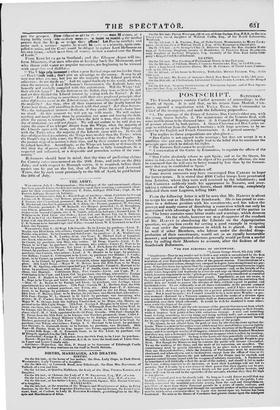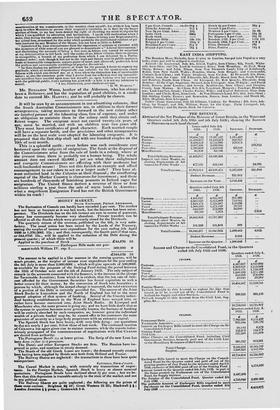- -
PosTscRIPT SATURDAY.
The French papers contain Carlist aecomits of proceedings in the North of Spain. It is said that, on his return from Madrid, Con- nor.. opened a negotiation with VILLA the Commander itt Chief of the insurgents, and made the following proposals-
" I. The marriage of the Prince of Asturias, Dun titrlos's eldest son with the young Queen Isabella. 2. The maintenance of the Estatuto Real, with some modifications to be discussed later. :3. A Council of Regency, consisting of persons selected by both parties. 4. Queen Chtistina and Don Carlos en- gage to withdraw from the Spanish territory ; with large pensions, to he se- cured by the English and French Governments. 5. A general amnesty."
The replies to these propositions are also given--
I' Don Carlos is not opposed to the marriage ; but does not accept it as a condition sine qua non, which might lead to the belief that he renounces the pt inciple upon which he defends his rights
" The Estatuto Real cannot be maintained.
" convocation of the Cortes by Estamentos, to regulate the affairs of the kingdom. " Don Carlos absolately refuses to quit Spain; and as for the Queen, big sister. in-law, as she has ever been the object of his particular affection, she may be convinced that she will even he better treated by him than by the Govern- ment that May be established in Spain."
The negotiation was then broken off.
Some recent successes may have encouraged Don CARLOS to hope' for better terms. It is stated that 4000 Carlist troops have penetrated into Asturias, where they were well received by the inhabitants; and that CABRERA suddenly made his appearance in Navarre, and over- taking a column of the Queen's forces, about 3000 strong, completely defeated them near Logrono, killing 1000.
From the following letter it will be seen that Mr. HARVEY is about to resign his seat as Member for Southwark, He is too proud to con- tinue in a dubious position with his constituents, and has taken the prompt and manly course of dissolving a connexion which can only be maintained with advantage by the mutual confidence of the parties to it. The letter contains some bitter truths and warnings, which deserve attention. On the whole, however we may disapprove of the conduct of Mr. HmtvEv in abandoning the Liberals on the Appropriation question, we give him credit for setting a good example in resigning his seat tinder the circumstances in which lie is placed. It would be well if other Members, who labour under the decided dial-
duty by calling their Members to account, after the fashion of the Southwark Reformers.
"TO THE ELECTORS OF SOUTHWARK.
G rent George Street. 8th July 1836.
" Gectlemen—True to my resolve not to hold a seat hich is unsustained by the Mu and entire sanction of' my constituents, I avow my intention to retire from the nepre- sentation or your liorougli before the close of the present session. Considerations of a political iota personal nature, though very unequal in degree. have strengthened my pur- pose. It has ever been my opinion that the representatives of large constituencies ought to stand aloof from party—the bane of all good government—and. as the heralds of the piddle voice, frequently and fearlessly to advocate and urge on those political changes, which, however unpalatable to the " privileged orders," are justly considered as essential to the good government of au enlightened people. Expediency. as you are aware, is the compass of party ; but 1 have ever repudiated its guidance, from t he conviction that public men are bound to immure the dictates of duty, a ithout regard to partial rind Incidental evils. To act differently is at all times censurable, at the present moment it is ctimitial—at least stich is my conscientious opinion ; and if 1 have erred in this respect, it is alone alto pay the penalty, tor a greater political sacrifice can no man make. lint it must be made; for I cannot consent to be a mere mute Member—a pas- sive numeral —flattered by a Treasury summons to seal the ranks of a division upon any question which two Contending parties shall so dexterously select, that no one is committed, save their blind adherents. It would be well for mankind if none others were made the dupes of the game. "The Irish Tithe Bill is not the sole measure of the present Government from which I dissent. Their entire policy is temporizing and timid—disheartening to their friends, a Idle it inspires 'heir political foes with audacious courage. A rude anti tremblingatrtetem.bLinhigt hand is doing something. to every thing. and doing nothing well ; and
remain until firmer and sturdier hearts shall strike out a course of government having for its sole (objects the safety and happiness and liberty of the people.
" My friends. be not allured front the path of duty by idle declamations against the • Lords. There is a mote in the nation's eye. which moist lie removed before you can rightly discern the seat of the disease. The master vice is in the street ure of the Houseof Com- mons ; and it is an object worthy of all inquiry, hence it is that three hundred Members find their way into a Reformed louse of Commons to oppose what is called, by courtesy. a" Reforming Government ?" So long as the Lords are ilms powerfully sustained, the Ministers will have little else to du than to receive their salaries. and the People to pay them. But though the Ministers may be content. the public will become dissatisfied. To toe the working of the thing, and the mode of its correction, are manifest. The constituency must be greatly extended, acting in no place with a smaller number than one thonsand electors ; while the duration of Parliaments must be materially shortened, and when chosen, not to he dissolved, except from the efflux of time or its own consent. By such:means the just influence of the People may be exerted, and popular control become armed mitt' the eapons of salutary correction. A Parliament so constituted will faithfully reflect the mind of the nation; and should it fail to make the Lords %silting converts to its measures. at least their Lordships still not fail to perceive that it is only by a as ise disuse ot' their weer that their dignity C411 be pre- sersed. Let Representatives so chosen firmly act. the part of vigilant masters, and there Skill •otal be an end to the squabbles of the servants, whether they they fill high or low places. •• The ;mammal pint may be shortly told. So long as I could flatter myself that my humble -ervice- nen; acceptable to my constituents, or useful to the public, Btu- asisly conloodeil the manifold privations arising from the rash and thoughtless et- pew itnre a more than thirty thonsand pounds in a series of costly contests, and hich has been greatly aggravated through the successful strokes of malice and oppres- sion by %% Ilia every successive effort to repair this inroad upon my fortune has been fruatrated No man in the House of Commons had greater claims upon the indulgent manner ; and misrepresented electors generally would per orm a useful probation of their constituents, would act in an equality honourable eounitleration at big eannituents, or the counts,. than myself t for. while it lots been *fen to other Members to pursue their respective vocations, as is done by the larger portion of them. to me has been denied the right of I Itt ect ing my mind to objects for which I am qualified by education and inclivation. I 'speak with motleration when state, that during the two sessions I have had the honour of being your Representative. my actual loss, occasioned by the order %Welt prohibits the professional conduct of pui irate busiuess by any Member of the House. has nut been no little as 6.0001. " Interdicted by your remonstrance from the expression of opinions at variance with the measures of what some of y on are pleased to denominate a' Liberal Governmeut." and disclaiming the anomaly of being a free man in fetters, you cannot be surprised at my determination to fall back into the ranks of my fellow citizens, there to pursue, In trinquillity, a branch of my profession from which I am debarred by a Perna. aleatory order ; and, though it lies not in the high and thorny road to public applause, leads to houourable competence. secures peace of mind, and, above all, protection num tIte restless and unreasonable medal isles of popular discontent. " In thus closing my political career, at least for the present. I denim to express my gratitude. which no momentary disquietude can enfeeble, for the spontaneous cheer- fulness with which you elected me, at a time when the distinction was of inestitnable value ; as also the conscious pride that I derive from the reflection that my inconside- rate sacrifices have recoiled upon none hut myself; as, upon looking over my account with the political public. I owe nothing but good-will—a debt it is not my intention to
wined. " I am, Gentlemen, your obedient servant. " D. W. IlsavEr."
Mr. BENJAMIN WOOD, brother of the Alderman, who has always been a Reformer, and has the reputation of good abilities, is a candi- date to succeed Mr. HARVEY; and he will probably be chosen.



























 Previous page
Previous page